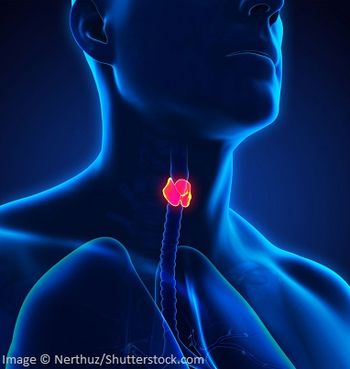
Oncology NEWS International
- Oncology NEWS International Vol 17 No 9
- Volume 17
- Issue 9
Japanese team discovers more cancer fallout
Radiation from the 1945 atomic bomb blasts in Hiroshima and Nagasaki, Japan, most likely rearranged chromosomes in some survivors who later developed papillary thyroid cancer as adults, according to a new study out of Japan.
Radiation from the 1945 atomic bomb blasts in Hiroshima and Nagasaki, Japan, most likely rearranged chromosomes in some survivors who later developed papillary thyroid cancer as adults, according to a new study out of Japan.
Researchers from the Hiroshima-based Radiation Effects Research Foundation (RERF) reported that young subjects, who lived close to the blast sites and developed cancer quickly once they reached adulthood, were likely to have a chromosomal rearrangement known as RET/PTC.
This genetic anomaly is not commonly found in adult onset thyroid cancer, according to Kiyohiro Hamatani, MD, and colleagues in the foundation’s department radiobiology and molecular epidemiology (Cancer Research 68: 7176-7182, 2008).
Dr. Hamatani and colleagues made a comparison between adult-onset papillary thyroid cancers with RET/PTC rearrangements and those with a BRAF mutation.
The researchers looked at the genetic profile of cancer patients (50 exposed to atomic bomb radiation and 21 who were not) in the RERF’s follow-up study. Three factors were independently associated with the development of adult-onset papillary thyroid cancer with RET/PTC rearrangements: greater radiation dose, shorter time elapsed since radiation exposure, and younger age at the time of the bombings.
Articles in this issue
over 17 years ago
Panel pans FDG-PET for new Medicare oncology coverageover 17 years ago
Sen. Kennedy's brain tumor puts spotlight on new treatmentover 17 years ago
Precise resection in colon cancer may boost survivalover 17 years ago
Payer’s budget to get right targeted drug to right patientover 17 years ago
PET brings treatment changes in majority of colon ca casesover 17 years ago
High death rate brings prostate ca vaccine trial to a haltover 17 years ago
Radiofrequency ablation eliminates nondysplastic BEover 17 years ago
Childhood cancer research gets $30 million from fedsover 17 years ago
Amgen scores FDA approval for low-platelet treatmentNewsletter
Stay up to date on recent advances in the multidisciplinary approach to cancer.





































